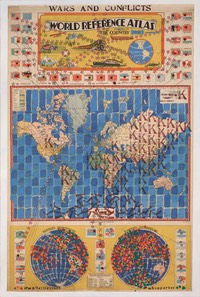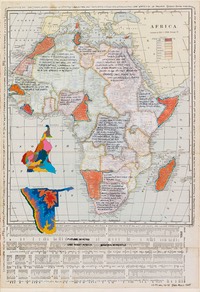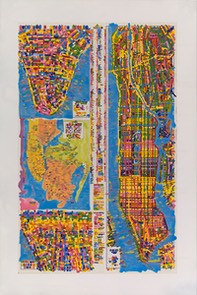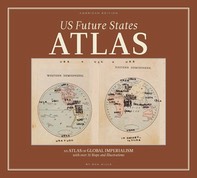Mills’ work has a surprising freshness and dynamism for the amount of data it holds. He says it took him three years to figure out how to translate the energy and spontaneity from his sketchbooks and notebooks into larger artworks. In mastering that transformation, Mills has achieved an art form that is perfectly suited to our time.
—Corwin Levi, Profile: Dan Mills, Art New England, September/October, 2019
The central paradox of his map pieces is that, even as they record the woes of the world, they are stunning and seductive. The visuals engage; the numbers appall.
—Carl Little, "An Artist’s Maps of Imperialism and Greed”. Hyperallergic, August 10, 2019
Mills’ style takes on elements of redaction, interruption, marginalia, collage, sociology and much more. It’s part Duchamp, part Darwin and part Warhol. It’s insightful, and Mills’ questions are deftly designed to chip away at our assumptions. But while it is undeniably subversive, Mills’ project could not be more humanistic or compassionate.
“Human Topographies” is a complete show: It’s interesting, educational, entertaining and important.
—Daniel Kany, "Art Review, Mapping data makes for informative art at CMCA". Maine Sunday Telegram, July 7, 2019
He’s experimenting, for example, with making maps that use emperical data about things like taxes and incarceration rates, and pairing them with studies about people’s happiness and sense of freedom. He’s interested in whether there’s a correlation between taxes and contentment, or peace of mind and prisons. He’s not making conclusions as much as he is satisfying his innate curiosity.
—Bob Keyes, "At Bates, museum director his work as curator and artist”. Maine Sunday Telegram, February 22, 2015
US Future States Atlas - Dan Mills: Satire comes in many forms, and this collection of Dan Mills' work proves that a picture is worth far more than a thousand words. In response to George W. Bush's lame excuses for the invasion of Iraq, Mills has divided the world up into its component parts if it were all part of the United States Empire. Each new "state" comes complete with descriptions of the benefits derived by the original United States from occupying it, and lists the reasons its annexation was a necessity. Brilliant, scary, and intelligent, it would be side-splittingly funny if there wasn't such the ring of truth to it. It's as accurate a reflection of America's "me first" attitude towards the rest of the world as I've ever seen depicted in any media. This is a mirror not many people are going to like looking in, but if you have the courage to do so you might begin to understand the resentment so many other countries feel towards the United States.
—Richard Marcus, "Best Reads of 2009". Blogcritics, December 24, 2009
Why stop at 50? As Dan Mills points out in the mock manifesto accompanying his terrific show at Sherry Frumkin, these United States of ours cohered over time—starting with 16 territories in the 18th century, adding 29 in the 19th, and five more in the 20th. "As we consider U.S. history," he writes, "a pattern of expanding by at least five states every fifty years exists, with the exception of the last fifty or so. We clearly having some catching up to do.
—Leah Ollman, "Art Review: Dan Mills at Sherry Frumkin". Los Angeles Times, Dan Mills at Sherry Frumkin, October 30, 2009
It’s no longer ruled. It’s owned.
—Arundhati Roy
When we look back less than a decade and consider the results of U.S. foreign policy decisions, predicated on and driven by long- and short-term global military-industrial ambitions, they have not been much less surprising or absurdly self-centred than the picture painted by artist Dan Mills' conceptual project US Future States Atlas. When we look back at U.S. foreign policy since the Mexican-American War in the 1840s and right through to the freshly-minted Obama administration's stances on the Middle East (particularly as regards its continuation of the disastrous Israel-Right-Or-Wrong position of previous U.S. administrations), the ongoing occupations of Iraq and Afghanistan, and, most significantly, the unquestioned and clearly-stated intention to continue, through a sustained massive global military presence, to act unilaterally whenever, wherever and with whatever force the U.S. government alone deems appropriate, the predictable imperialist picture seems quite clear.
—Viggo Mortensen, Perceval Press. May, 2009



